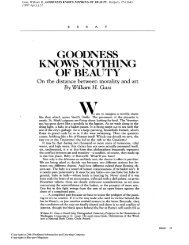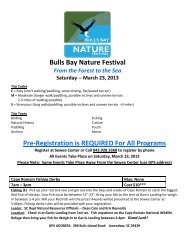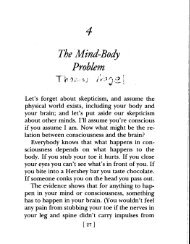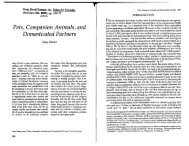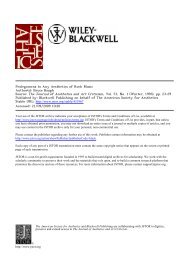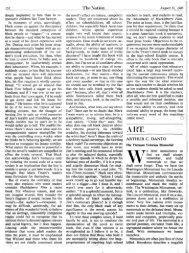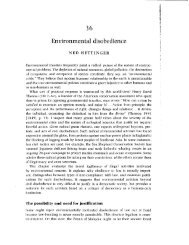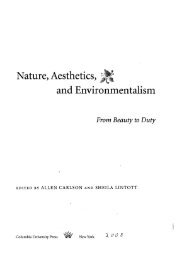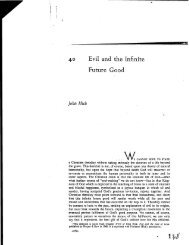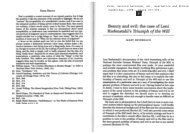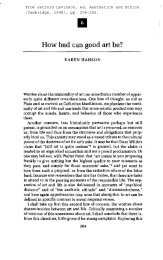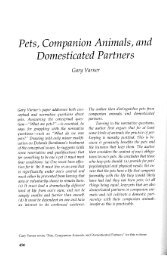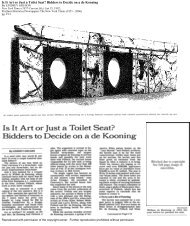Carl Cohen's 'Kind' Arguments For Animal Rights and Against ...
Carl Cohen's 'Kind' Arguments For Animal Rights and Against ...
Carl Cohen's 'Kind' Arguments For Animal Rights and Against ...
Create successful ePaper yourself
Turn your PDF publications into a flip-book with our unique Google optimized e-Paper software.
44 Nathan Nobisposition provides, in a certain sense, a moral defence of animals: his views are fundamentallycontrary to the views of those who appeal to him to try to defend theirharmful uses of animals [3].2. Moral <strong>Rights</strong>Some philosophers reject talk of ‘rights,’ but here I will presume that the true moralityincludes moral rights. What does Cohen mean by ‘rights’? This must be understood inorder to evaluate his arguments that humans have rights but animals have none.Cohen briefly explains his concept:A right, properly understood, is a claim, or potential claim, that one partymay exercise against another. The target against whom such a claim may beregistered can be a single person, a group, a community, or (perhaps) allhumankind [4].Here, the question is whether animals have a claim to their most fundamental interests— in not being subject to pain <strong>and</strong> suffering, in retaining bodily <strong>and</strong> mental integrity,<strong>and</strong> in life itself [5], — being respected, even if failing to respect those interests wouldbenefit humans. As Cohen puts it, the question is whether animals have “the right notto be used like inanimate tools to advance human interests . . . no matter how importantwe think those human interests to be” [6].Cohen’s conception of rights is consistent with Tom Regan’s brief explanation ofwhat it is to have rights:To have a right is to be in a position to claim, or to have claimed on one’sbehalf, that something is due or owed, <strong>and</strong> that the claim that is made is aclaim against somebody, to do or forbear what is claimed as due [7].Here what is ‘due’ or ‘owed’ is respectful treatment. Cohen <strong>and</strong> Regan agree thatif animals are due this respect, then all industries <strong>and</strong> practices that exploit animalsfor their instrumental value ought to be abolished, <strong>and</strong> the individuals involved inthis exploitation should be stopped. And this is true, regardless of the possible losses tothe exploiters: they have no right to ill-gotten gains. Thus, the picture of rights is thatof invisible ‘No Trespassing’ signs <strong>and</strong> moral ‘trump’ cards, an exceedingly nonutilitarian<strong>and</strong> non-aggregative moral outlook. <strong>Rights</strong> impose the duty that justice isdone, as the saying goes, ‘though the heavens fall.’These characterizations are rough <strong>and</strong> raise many difficult theoretical questionsabout the nature of rights [8] but are sufficient for our purposes.3. An Underst<strong>and</strong>able Misinterpretation of Cohen’s ArgumentLet us agree that humans have moral rights in the sense that Cohen specifies. Ifhumans have rights <strong>and</strong> animals have none, this must be explained by some differencebetween humans <strong>and</strong> animals. Cohen must hold that there is some necessary conditionfor having rights that humans meet but that all animals fail to satisfy.© Society for Applied Philosophy, 2004



